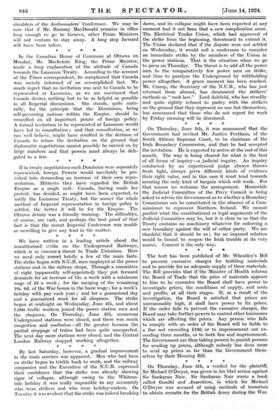By last Saturday, however, a gradual improvement in the train
services was apparent. Men who had been on strike began to trickle back to work, and the railway companies and the Executive of the N.U.R. expressed their confidence that the strike was already showing signs of collapse, although owing to the Whitsun- tide holiday it was really impossible to say accurately who were strikers and who were holiday-makers. On Tuesday it was evident that the strike was indeed breaking down, and its collapse might have been expected at any moment had it not been that a new complication arose. The Electrical Trades Union, which had approved of the strike from the beginning, threatened to extend it. The 'Union declared that if the dispute were not settled on Wednesday, it would call a conference to consider an immediate strike by the members of the Union in the power stations. That is the situation when we go to press on Thursday. The threat is to add all the power men to the comparatively few power men on strike, and thus to paralyse the Underground by withholding power altogether. A grave moment has been reached. Mr. Cramp, the Secretary of the N.U.R., who has just returned from abroad, has denounced the strikers' methods as "mob law." Lord Ashfield, who has steadily and quite rightly refused -to parley with the strikers on the ground that they represent no one but themselves, has announced that those who do not report for work by Friday morning- will be dismissed.
a *










































 Previous page
Previous page